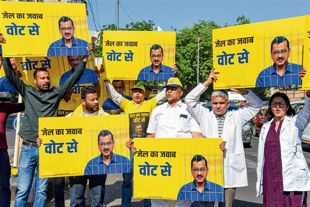
Usha Albuquerque
Engineers work with structures, tools, machines, metals, chemicals, and a variety of different materials, and use their analytical skills and creativity to innovate and create new things or bring modifications to the already existing machines. As engineering covers so many different articles and devices, there are many and various fields of engineering.
Production engineering is one discipline of engineering that combines manufacturing technology with management science so as to accomplish the production process in the smoothest, most-judicious and most-economic way.
A production engineer typically has a wide knowledge of engineering practices and is aware of the management challenges related to production. All manufacturing industries require production engineers who deal with all aspects of the production procedure — from procurement of raw materials to the processes involved till it reaches the market.
Once the design is finalised production engineers handle the efficient planning of the entire manufacturing system, from work-study, ergonomics and operation research, to co-ordinating tooling, manufacturing and materials management, production planning, transportation etc.
With the emergence of sophisticated production methods and control systems, there is an increasing demand for production engineers who reduce cost, increase efficiency and make their products marketable in the competitive era. Most leading manufacturing houses look out for production engineers who are able to design, implement and refine products, services, processes and systems of manufacture, make proper use of maths and statistics to model production systems, incorporate concepts and quality techniques in the production system, forecast and analyse demand so as to design, redesign or improve the product/service functionality, and deploy organisational standards for control proceedings and auditing.
Training
Most BTech programmes in Production Engineering emphasise on manufacturing and improvement of productivity. The study of Production Engineering constitutes topics like operations management, production and manufacturing engineering. A student develops a sound knowledge of the overall industrial production and learns to analyse the emerging technological trends of the industry.
A production engineer requires to have a wide set of skills, competencies and attitudes based on the market requirement and scientific knowledge. These abilities are fundamental for the performance of coordinating and integrating professionals of multi-disciplinary teams.
There are several universities and institutes offering the BTech specialisation in production engineering. These include NIIT Tiruchi, VIT, UPES and others. Some institutes combine Production and Industrial engineering in one specialised discipline.
Job prospects
There are lots of opportunities and scope after doing graduation in this field. As production engineering also covers a part of mechanical engineering there is a lot of demand for production engineers — both in public and private sectors.
Production engineers are recruited by companies with factories and manufacturing units with the objective of improving efficiency and effectiveness of both manufacturing and service sector Industries.
These engineers are recruited for inspection, quality control, operation of automated equipment, to control assembly line and for production management in automobile manufacturing and other large manufacturing companies. They can also join process industries, IT companies, food processing companies, defence production, the Railways and other government and public sector organisations such as ONGC, NTPC, BHEL, GAIL, and others.
Career cursor
Often there is some confusion among young candidates of engineering when offered specialisation in Production Engineering where the rankings are lower than for other more sought after disciplines such as mechanical engineering.
For those looking for a technical job in the manufacturing industry, the option of production engineering offers the same job opportunities and placements, and can be a useful route for a strong technical work experience and a good alternative to mechanical engineering.
Moreover, as production engineering covers all kinds of industrial production, such engineers have many more work options to choose from.
After graduation one can take up further studies with an MTech in mechanical or any other engineering specialisation after the GATE exam for seats in an NIT or IIT.
You would also need a good GATE score to get placed in a large public sector company such as BHEL, SAIL, NALCO etc. Almost every year many government public sector companies recruit production engineers as Management Trainees or Executive Trainees.
Alternatively one can opt for a general MBA, or (MBA) in Product Engineering Management, which can be beneficial for one’s career as production engineering as a discipline involves management too.
So if you have the option of a seat in Production Engineering, do not hesitate to accept it, as your career growth can be as advantageous as in any other field.
Scope
Production engineering has a good scope in India with the potential growth of the manufacturing sector, which according to a report by Mckinsey and Company, could touch US$ 1 trillion by 2025.
The Government of India has taken several initiatives to promote a healthy environment for the growth of the manufacturing sector in the country fuelled by the ambitious ‘Make in India’ programme. Consequently , the scope for production engineers in the manufacturing sector will continue to increase as the demand for improved machinery and machine tools grows. With the growth in infrastructure there has been a resurgence of the engineering field and growing job opportunities for engineers in private industry and public sector — railways, telecommunications, electricity departments, defence services, research organisations and laboratories.
India has become one of the most attractive destinations for investment in the manufacturing sector, with companies such as Hero MotoCorp which has planned to invest Rs5,000 crore (US$ 785.79 million) in five manufacturing facilities across India, Colombia and Bangladesh; Toshiba that has planned to make India the design, manufacturing and export hub for its lighting business; a consortium of Chinese automobile companies that has planned to make Gujarat’s Sanand an electrical vehicle (EV) manufacturing hub; Honeywell Aerospace that has signed a licensing agreement with Tata Power Co Ltd’s strategic engineering division (SED), and many other expansion proposals . The government also has an ambitious plan to locally manufacture as many as 181 products, which India currently imports at a cost of at least $18.1 billion. The move could also help infrastructure sectors such as power, oil and gas, and automobile manufacturing that require large capital expenditure and revive the Rs1.85 trillion Indian capital goods business. Such an industrial climate provides excellent opportunities for those looking for a challenging career in production engineering.



























